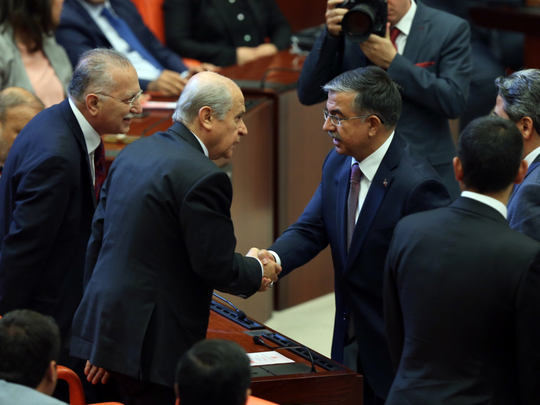
Ankara: Turkey’s parliament voted along party lines on Wednesday to elect as its speaker Ismet Yilmaz, Defence Minister from the ruling AK Party, reducing prospects of a grand coalition between the assembly’s two biggest parties.
Had a consensus candidate been elected speaker, it could have pointed to a coalition between the AKP, which finished first in a June 7 ballot but was deprived a majority, and the main opposition Republican People’s Party (CHP).
But the voting pattern pointed more in the direction of a coalition between the AKP and the right-wing Nationalist Movement Party (MHP).
All coalition options could be hampered by differences over domestic and foreign policies and by AKP founder and president Tayyip Erdogan’s determination to play a pivotal role in government. The election dashed his immediate ambition to imbue his largely symbolic presidency with sweeping executive powers.
Yilmaz’s 258 votes in the fourth round of voting for the speakership, a largely procedural but symbolically important role, in the 550-seat assembly reflected the number of seats held by the AKP.
The centre-left CHP put forth veteran politician Deniz Baykal, hoping he could attract votes from the Islamist-rooted AKP and other parties and signal coooperation in the first parliament not dominated by an AKP majority since 2002.
An AKP-CHP coalition would have likely been fragile, but analysts said it could help placate jittery foreign investors and revive attempts to end a 30-year Kurdish insurgency.
Turkey’s NATO allies are also eager to see a stable government able to cope with hazards posed by wars across its borders in Syria and Iraq, not least with the rise of Daesh.
The AKP’s likelier junior partner now appears to be the right-wing MHP, which opposes negotiating a settlement with Kurdish militants.
Under party leader Devlet Bahceli’s orders, MHP lawmakers did not cast votes for either Yilmaz or Baykal, which CHP officials said amounted to tacit support for the AKP.
“One party leader presented this outcome to the AKP on a golden platter. We saw those who claimed to be rejecting everything support (the AKP),” said CHP spokesman Haluk Koc.
“There’s no need to look any further for a coalition partner, the candidates are now out in the open.” While the conservative AKP and MHP share a base, Bahceli has repeatedly made demands, such as pursuing corruption charges against AKP officials, that would make forming a coalition tenuous, thereby increasing the odds of a snap election.
With the speaker’s election, Erdogan will now give a mandate for coalition talks to acting Prime Minister Ahmet Davutoglu.











